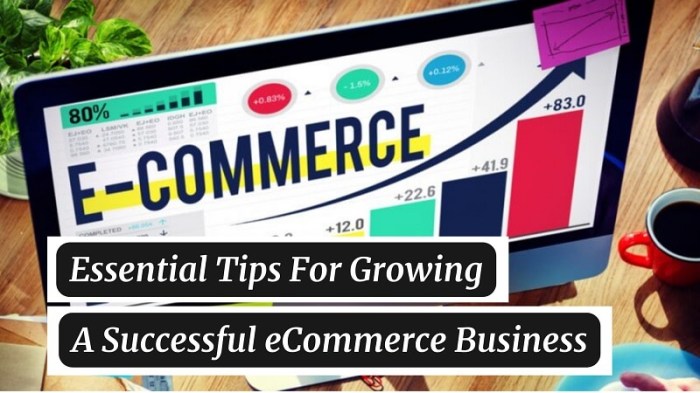E-commerce Growth Tips: Boost Your Online Business Success opens the door to a world of digital entrepreneurship, where savvy strategies and user-centric design pave the way to profit and growth. Dive into the realm of e-commerce with a fresh perspective and actionable insights that will take your online store to the next level.
From the importance of e-commerce growth to leveraging data for success, this guide will equip you with the tools and knowledge needed to thrive in the competitive online market. Are you ready to revolutionize your e-commerce game? Let’s get started!
Importance of E-commerce Growth
Yo, listen up! E-commerce growth ain’t just a trend, it’s a game-changer for businesses of all sizes. This digital evolution opens up a whole new world of opportunities for companies looking to expand their reach and boost their revenue.
Impact on Revenue and Market Reach, E-commerce Growth Tips
When a business jumps on the e-commerce bandwagon, it’s like unlocking a treasure trove of potential profits. By selling online, companies can tap into a global market 24/7 without the limitations of a physical store. This means more sales, more customers, and ultimately, more cash flow.
- Online stores can reach customers across the globe, breaking down geographical barriers.
- With e-commerce, businesses can operate round the clock, catering to customers’ needs at any time.
- By leveraging digital marketing strategies, companies can target specific audiences and drive more traffic to their online stores.
Successful E-commerce Growth Stories
Check out these inspiring success stories of businesses that have seen major growth thanks to their e-commerce ventures:
- Amazon: Started as an online bookstore, now the e-commerce giant sells everything under the sun.
- Etsy: This platform has empowered independent creators to reach a global audience and turn their passion into profit.
- Warby Parker: Disrupting the eyewear industry with its direct-to-consumer model, Warby Parker has become a household name in the e-commerce world.
Strategies for E-commerce Growth: E-commerce Growth Tips

In the competitive world of e-commerce, implementing effective strategies is crucial for achieving growth and success. Let’s explore key strategies that can help boost your e-commerce business.
Role of and Digital Marketing
and digital marketing play a vital role in expanding your e-commerce reach and visibility. By optimizing your website for search engines and utilizing various digital marketing channels, you can attract more traffic to your e-commerce platform. Implementing targeted s, creating engaging content, and leveraging social media platforms can significantly enhance your online presence and drive more conversions.
- Optimize your website for search engines by using relevant s and meta tags.
- Utilize social media platforms to promote your products and engage with your target audience.
- Invest in digital marketing campaigns such as PPC advertising and email marketing to reach a wider audience.
- Monitor and analyze the performance of your and digital marketing efforts to make data-driven decisions for continuous improvement.
Tactics for Improving Conversion Rates
Improving conversion rates is essential for maximizing the profitability of your e-commerce business. By implementing effective tactics, you can increase the likelihood of turning website visitors into paying customers. Utilize strategies that focus on enhancing user experience, optimizing product pages, and streamlining the checkout process to boost conversion rates.
- Optimize product descriptions and images to provide detailed information and visuals that persuade customers to make a purchase.
- Simplify the checkout process by reducing the number of steps required and offering multiple payment options to enhance convenience for customers.
- Implement personalized recommendations and targeted offers based on customer behavior and preferences to encourage repeat purchases.
- Utilize A/B testing to experiment with different website elements and identify the most effective strategies for improving conversion rates.
Enhancing User Experience

User experience plays a crucial role in the success of an e-commerce business. It directly impacts customer satisfaction, retention, and conversion rates. A seamless and user-friendly website can significantly enhance the overall shopping experience, leading to increased sales and revenue.
Optimizing Website Usability and Navigation
Improving website usability and navigation is essential for enhancing user experience. Here are some tips to optimize these aspects:
- Simplify the design: Keep the layout clean and clutter-free to make it easier for customers to find what they are looking for.
- Intuitive navigation: Ensure easy and intuitive navigation with clear menus, categories, and search functionality.
- Mobile responsiveness: Make sure your website is optimized for mobile devices to provide a seamless shopping experience across all platforms.
- Fast loading speed: Improve loading speed to reduce bounce rates and keep customers engaged.
- Clear call-to-action buttons: Use prominent and clear CTAs to guide users through the purchasing process.
Impact of Mobile Responsiveness
Mobile responsiveness is crucial for e-commerce success in today’s digital landscape. With the increasing use of smartphones for online shopping, having a mobile-friendly website is no longer optional. Here’s why mobile responsiveness matters:
- Improved user experience: Mobile-responsive sites provide a seamless shopping experience on smartphones and tablets, leading to higher customer satisfaction.
- Higher search engine rankings: Google prioritizes mobile-friendly websites in search results, boosting visibility and traffic.
- Increased conversions: Mobile users are more likely to make purchases on websites that are optimized for their devices, leading to higher conversion rates.
- Competitive advantage: Having a mobile-responsive website sets you apart from competitors and attracts tech-savvy customers.
Leveraging Data for Growth
Data analytics plays a crucial role in driving e-commerce growth by providing valuable insights into customer behavior, preferences, and trends. By analyzing data, businesses can make informed decisions to improve their strategies, optimize processes, and enhance the overall shopping experience for customers.
Role of Customer Data in Personalizing E-commerce Experiences
Customer data is essential for personalizing e-commerce experiences as it allows businesses to understand individual preferences, purchase history, and browsing patterns. By leveraging this data, companies can create targeted marketing campaigns, recommend personalized product suggestions, and tailor promotions to meet the specific needs of each customer.
- Utilize purchase history to recommend related products
- Segment customers based on behavior for targeted promotions
- Personalize email marketing based on browsing history
Examples of Using Data-Driven Insights to Enhance E-commerce Performance
Data-driven insights can significantly impact e-commerce performance by identifying areas for improvement, optimizing marketing strategies, and increasing conversion rates. Here are some examples of how businesses can use data to enhance their e-commerce performance:
- Identifying popular products to optimize inventory management
- Analyzing website traffic to improve user experience and navigation
- Monitoring conversion rates to optimize pricing strategies
